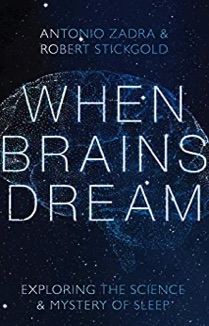The Science of Consciousness:
Chapter 13: Dreams
What this chapter is about: What are dreams, and why do we dream?
Everyone likes a good dream. This chapter is about the origin, nature, and biology of dreaming. Do they mean anything? Is there any support for the well-known Freudian intepretation of dreams?
There does seem to be something missing in most dreams when we contrast them with waking life: some kind of monitoring, or self-awareness. We don't know we're dreaming, in the way that we know and can reflect on being awake. In some dreams though there is knowledge that we are dreaming: such dreams are called lucid dreams.
On the other hand my dreams often amaze me in terms of their originality, and coherence, and I'm sure I'm not alone in thinking that. When I think about them I often wonder "where did that come from?". No wonder that across time people have thought that some dreams at least must have been given to them.
Dream content and analysis
I am sceptical that dreams are merely the random byproduct of cognitive processing without top-down control; they are far too imbued with signifcance for that. Some dreams recur, some are linked to important people and events, and some have a high emotional content. And what is meant by "random", anyway? Random with respect to what? Why are some associations generated but not others? On the other hand, there might not be just one mechanism by which they are generated. I'd say there are several.
As noted in my book (p. 320), Calvin Hall (1909 - 1985) was the first person to examine the content of the dreams of a large sample of people, calling his method content analysis (1953). He concluded that dreams attempt to resolve five basic themes:
freedom and security
life and death
love and hate
masculinity and feminity
right and wrong
Hall's is often called a cognitive theory of dreaming, saying that a dream is simply a thought that occurs while sleeping, usually making use of visual images.
The technique of working with dreams to examine your own psychology and your life is often called dreamwork. Dreamwork was firsts popularised by the psychologist Ann Faraday, whose 1972 book dream power is credited with being the first best-selling popular book on dreams, and which took dream analysis out of therapy and to the people
Recurring dreams
One reason I am very sceptical that dreams are just random noise is because of the existence of recurring dreams. I have several, some of which I know are common: being naked in public (surely to do with embrassment and fear of being seen though, and perhaps to do with the impostor syndrome); exam dreams (turning up to an exam, usually A-level, completely unprepared; more recently I've had an older person's variant where I turn up to give a presentation unprepared and without slides; surely to do with anxiety); airplanes falling out of the sky nearby (since my earliest days); and nuclear weapons exploding nearby (in one memorable dream in my teenage years right behind my head, as I lay accepting my fate; after it went off, I was floating in an eery darkness, hearing disembodied voices).
Nightmares
Prazosin in a type of alpha blocker used to treate high blood pressure and an enlarged prostate, among other things. As noted in my book, it is also used treat PTSD by reducing the frequency of nightmares. How it has this effect is currently not known. There is a suggestion that it reduces noradrenerfic stimulation and thereby affects the startle and fear responses.
There is some recent evidence that more frequent nightmares are an early indicator of Parkinson's disease (Otaiku, 2022). Of course that does not mean that just because you have nightmares that you will get Parkinson's disease! It has been known for some time that Parkinson's disease is associated with an increased rate of distessing dreams, probably due to structural changes in the brain.
Otaiku, Dr Abidemi I. ‘Distressing Dreams and Risk of Parkinson’s Disease: A Population-Based Cohort Study’. EClinicalMedicine, June 2022, 101474. https://doi.org/10.1016/j.eclinm.2022.101474.
Siclari, Francesca, Katja Valli, and Isabelle Arnulf. ‘Dreams and Nightmares in Healthy Adults and in Patients with Sleep and Neurological Disorders’. The Lancet Neurology 19, no. 10 (October 2020): 849–59. https://doi.org/10.1016/S1474-4422(20)30275-1.
Zhang, Ye, Rong Ren, Larry D. Sanford, Linghui Yang, Yuenan Ni, Junying Zhou, Jihui Zhang, et al. ‘The Effects of Prazosin on Sleep Disturbances in Post-Traumatic Stress Disorder: A Systematic Review and Meta-Analysis’. Sleep Medicine 67 (March 2020): 225–31. https://doi.org/10.1016/j.sleep.2019.06.010.
Boring dreams
In contrast to nightmares, some of my dreams are just very boring. I'm sure others must have these too. After a blood curdling scream detected by voice-activated recorder, I reported that "I dreamt that I was just making a nice cup of tea". Another occasion: I dreamt very clearly that I was turning up the volume on my Alexa by pressing the + sign. That was it.
Links to pages on dreams
Schneider and Domhoff's site on the statistics of the contents of dreams.
New books on dreaming
Zadra, A., & Stickgold, R. (2021). When brains dream: Exploring the science and mystery of sleep. New York: Norton. ISBN: 9781324002833.
It's a shame that this book came out too late for me to discuss in my text, because it's superb, giving the best coverage of dreams and dreaming in recent years.
Things that should be included in any discussion of dreaming:
The NEXTUP model of dreaming.
Description of dream content.
The purpose of dreaming as involved with learning.
Llewellyn, S. (2020). What do dreams do? Oxford: OUP. ISBN: 97801988189533.
Another excellent book that I would have mentioned. Llewellyn argues that dreams have evolved to aid survival by encoding important memories and letting us experiment mentally in our sleep. Dreams enable us to make connections between seemingly random things, and are essential for creativity. The book is also another excellent review of the dream research literature, particularly and unusually coverintg mental illness, espeically schizophrenia. Essential reading for anyone interested in dreams
Blagrove, M., & Lockheart, J. The science and art of dreaming. (2023). London: Routledge. ISBN 9780367479947.
I haven't read this book yet, but it looks very interesting. Combines the science of dreaming with original artwork depicting dreams. The book proposes that the sharing of human dreams increases empathy. In my experience when I say to someone "let me tell you about my dream", they immediately fall asleep.

Book reviews



